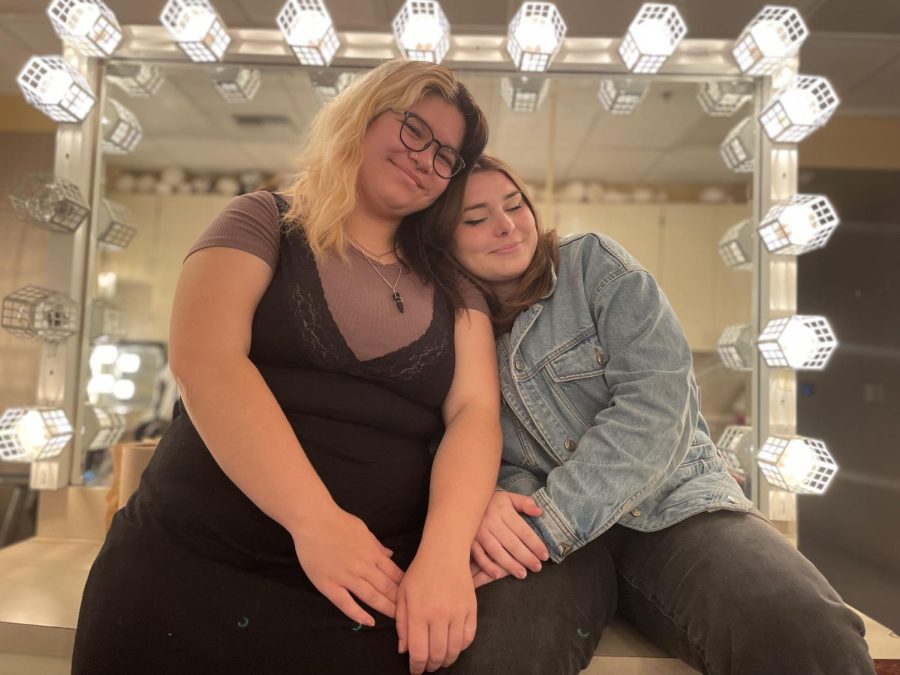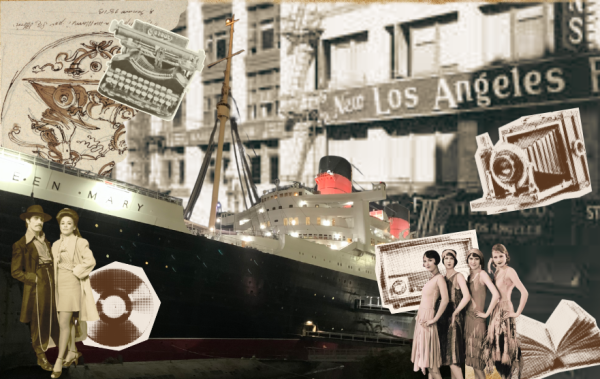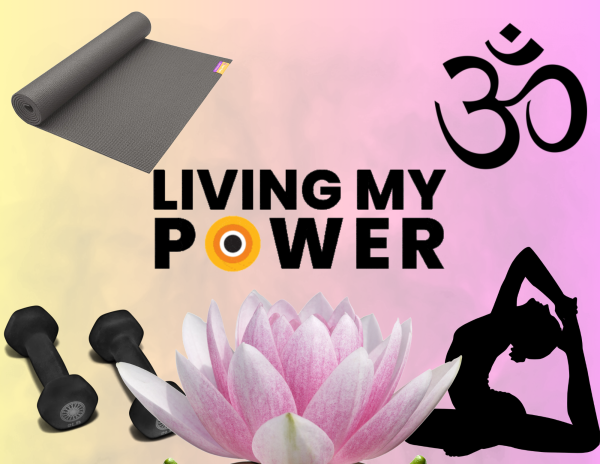A Society of Fat-Shaming
Warning: This article mentions eating disorders, fat-shaming, and talks of poor mental health.
HBHS Seniors Drew Dela Llana and Payton Moore posing together.
Since the start of the sad girl epidemic that took place in the early 2010s on Tumblr, the romanticism of women under-eating has become extremely common. While it is very important that we strive not to normalize under-eating disorders, they are not the only thing causing harm to the image of women. The idea that women, especially young girls, should skip meals to have a tiny frame can be especially harmful to bigger girls who have normal eating habits or binge eating disorders. As a teenage girl who has never been as skinny or had as small of a frame as girls my age, I have dealt with shame over my weight and how I look for my entire life.
Growing up as a gymnast was particularly damaging to the image I had of my body. Genetically, I was built a little bigger, my bones a little thicker, but after years and years of being shoved into a tiny leotard and standing next to girls half my weight, I became self-conscious of how my body looked compared to theirs. While gymnastics was something I enjoyed immensely, it was very destructive to my sense of self-worth.
During my first competition season of gymnastics, I was given a very stiff and easy floor routine. I loved the routine. My teammates learned it and did it with me from the side of the floor in support, which made me feel better about myself while doing it. However, I was seven and wanted to do pretty and flowy dances like all of the rest of the girls on my team. As a bigger girl though, my coach did not see me as being able to pull off such routines. So, I did the rigid and powerful routine — and killed it for years, might I add — but despite my love for the piece, I felt a lingering desire to prove that I could do the elegant movement.
Being young and impressionable, I took the things that authority figures, especially my coaches, said to my heart, and down I fell into the rabbit hole of weight insecurity. As I became more insecure about my weight, I learned that the normalization of eating disorders and the romanticization of severely underweight girls continues to be a prevalent theme in different forms of media such as television shows, movies, and books.
With this idea swarming the media, feminine presenting people think that these seemingly “perfect” main-character girls are what they should strive to be. Girls who do not fit this unrealistic standard are often led down a path of shame, which can be very dangerous and damaging to both their physical and mental health.
When you don’t fit society’s set stereotype, you are looked at as if you don’t belong or that you are lesser than everyone around you. Many girls in our society suffer silently without a healthy way to make themselves feel like they belong.
“I was anorexic from seventh to ninth grade and had to be hospitalized more than once,” said Gabrielle Dorren, a senior in the Huntington Beach Union High School District. “I thought if I didn’t have a thigh gap or a nonexistent weight then I was worthless. I have developed many medical issues from that time, which I deal with every day as a reminder.”
Dorren suffered an eating disorder in order to try to fit into society’s vision of beauty, yet it did not make her feel any prettier. While Dorren has recovered since, her experience with an eating disorder made her health much worse in the long run. Dorren is just one example of the many plus-sized girls who have fallen victim to society’s stereotypes and the pressures put on young women to fit into size twos.
Clothing
I have been in musical theatre for seven years now. While it is something that brings me immense joy, I have found myself constantly looking down on myself for not being able to fit in the small costumes that they provide or not being featured in dances because I do not look as graceful as the smaller girls. Costuming in musical theatre can be quite a triggering experience for girls whose body types do not fit society’s norms. I have spent so many hours hiding in bathrooms around the theatre and crying because my costume did not fit right. The costumes are always either too small or three sizes too big.
One of the most prominent memories I have of costuming for shows was at the beginning of this year when I was costumed for a show that the Academy for the Performing Arts (APA) Musical Theatre Department put on. The show was Cabaret, and all of the Kit Kat Girls were bought slip dresses to wear for the show. I remember being so excited to get mine but instantly being heartbroken when I tried it on. The dress almost fit my hips but was way too big around my waist. The slip was also paired with a colored leotard which was way too small. Both items were labeled as three sizes above my actual size, yet they still did not fit well. I was distraught. I hid in the bathroom and wouldn’t come out because I was so insecure about how the costume fit.
Musical theatre directors sometimes have flawed perspectives of what a woman should look like, perpetuating the stigma surrounding the weight and appearance of cast members. Fountain Valley High School Senior in APA Musical Theatre, Hannah Robert, spoke out about her strugglings with costuming and musical theatre. “Being in musical theatre, I constantly have to be costumed. I…get a little uncomfortable because my body isn’t shaped like a lot of the really skinny girls in the show and so I don’t fit into a lot of the costumes like they do,” Robert says.
It may be hard to find things that make curvy women feel comfortable when extracurriculars force them to be fitted for clothes, but for bigger girls, this is a problem that exists with all clothes. Going to a clothing store is one of the most uncomfortable and terrifying things for a bigger girl. There is constant judgment from people when we try to shop in clothing stores. There are also little to no clothes that are made specifically for bigger young adults. In my experience, I have had ideas of how I wanted to dress for years, but no matter how hard I have tried to find clothes, nothing ever fits right.
Fashion is not designed for big girls. Many clothing stores never have anything in a size that actually fits anyone who is bigger than a size six, and the stores that do have a bigger size than a six make the clothes overly big and not form-fitting. The clothes they make for bigger size girls, specifically jeans, are made the exact same way they are made for girls with flat stomachs. This is a problem.
Girls with flat or small stomachs are able to wear jeans without the severe pain and discomfort of the rough material digging into their stomachs while they sit. Big girls never feel comfortable in jeans. It doesn’t matter if they are the right size or if they are too big because the material fits weirdly around our stomachs and makes us uncomfortable. It is because of this that I, and other girls my size, often are prevented from wearing clothes that are deemed fashionable and trendy.
“I would often find myself buying clothes that were too small for me in hopes that it would give me the motivation to lose the weight…I was very young. For me, my self-worth took a big hit, but for too many people it is much worse. You’re treated differently when you reach a certain size, and that size is much smaller than people think,” says Payton Moore, a senior at Huntington Beach High School.
Diet Culture
Being small and petite is pushed so heavily in our society that girls from a young age are told to “watch their weight” if their body is not built tiny. “[From] a young age, I [was] forced to watch weight loss shows like the Biggest Loser…my mom would use that [as a] scare tactic so I wouldn’t gain weight,” HBHS senior, Drew Dela Llana, explained.
Mothers, much like my own, often push their daughters to be a certain weight, scaring them into not eating with dieting methods. Throughout my childhood, I remember my mom making self-destructive comments about her own weight. Our bodies were of similar structure and her loathing caused me so much confusion at such a young age. To see that my mother—my role model—was insecure about her body hurt me in ways that will never recover from. I felt guilty because I wanted my mom to be happy and confident, and as it continued over the years, I began to find myself taking up the same self-destructive tendencies.
My mom was always searching for a new way to diet when I was growing up and more often than not, she would try to convince me to join her, hoping it would make me feel better about my weight. While I know she meant no harm by it, it really just made me feel worse. Even so, I gave in on several occasions and did the diet with her, because I wanted to support her as she had always supported me. However, while my mom’s relationship with food certainly affected mine, the most prominent culprit behind my insecurities is by far the impact of social media.
Social Media
When I was young, social media was just becoming normalized as a way to express the dumb and fun things in your life. As I got to middle school, however, there was a noticeable shift. It was no longer about the funny videos or the “repost for good luck” photos, it was about you, and more importantly about how you looked. As more girls began to post pictures of themselves in bikinis and cute outfits, I slowly started to realize that my clothes and my body were not up to par.
It’s no secret that in this day and age of self-help culture and an abundance of face-changing filters, that social media is a harmful place. The use of editing apps like Facetune takes an already toxic environment and makes it ten times worse, giving small girls the ability to make themselves look even smaller. It is very rare that I, and girls who look like me, can feel confident about our bodies when all we see in the media is small girls praised for their tiny waists and flat stomachs.
While people might think that these types of apps can make bigger girls feel better about themselves because they can alter how they look, instead the toxic culture of photoshop severely damages our mental health and how we view our bodies. While it’s easy to modify a little bit of your body, if we bigger girls wanted to edit our bodies to fit the norm, we would have to modify much more than that little bit. We would have to alter our bodies until the change was noticeable and then face the judgment we would receive when people saw us and realized we do not look the same as our photos.
This pressure that social media puts on bigger girls to change our appearance in order to fit in and be accepted by society can not only damage our ability to be comfortable in our bodies but can also damage our relationships. “I felt really out of place anywhere I went because of the thoughts instilled in my head at a young age by social media,” says Gabi Anguli, HBHS alumni. “There’s always been this pressure to lose weight in order to find happiness, love, success, etc. Because it’s always said in the media that the key to success is fitting into a list of criteria that is deemed ‘perfect’. It’s exhausting feeling like you simply existing is imperfect in some way.”
Since the society that we live in is so focused on how people look and on making assumptions about people based on solely that, it can be hard for bigger girls to form meaningful relationships, especially romantic ones. The idea that women can only be desirable if they are skinny is a very common one and, quite frankly, one that should end as soon as possible.
I’ve been a hopeless romantic my whole life, but I realized very early on that it was going to be harder for me to find my fairytale prince. There were so many times in my life when I was interested in someone and thought they were interested in me too, but was left depressed and alone after hearing that they could never be interested in me because my body “was not their type.”
People’s opinions on my weight and size have not only damaged my confidence but have also left my mental health in shambles. My view of my body left me so that I can seldom look in the mirror without feeling my eyes burn with the need to cry. I see myself, and I want nothing more than to cut my stomach off with a knife, and there was a time in my life when I nearly tried.
The idea that I should weigh a certain amount put me in such a dark place and caused me an unbearable amount of pain. It caused me to fall into bad habits that I have still yet to break. It has caused me to not weigh myself since seventh grade; today I am a senior about to graduate high school. Trying to fit into society’s idea of feminine beauty has left me with mental pain that is indescribable, and I am not sure that I will ever get over it.
The examples of feminine beauty that we are shown fit between a range of skinny to even skinnier. I remember growing up and seeing little to no girls who looked like me on television, and oftentimes, when girls who had a body type similar to mine were featured in the media, it included some sort of commentary on their weight. While times have changed since I was young and more women have begun to love and show off their bodies when they don’t fit society’s standards, it still is not normalized to have a bigger body type.
Despite the many women who have come forward loving their bigger bodies, people have still found ways to push them back into self-loathing, whether it be from hateful internet comments or making fun of them and talking about their eating habits rather than understanding that not all bodies are the same. And although the girls online and in-person that I see flaunting their bigger body types brings me so much joy, bigger girls should not have to advocate for themselves and work to be proud of our bodies. We should be given the same respect and love that smaller women get.
The view we have on women in our society is distorted and needs to be fixed. Bigger girls should be able to go about their daily lives without being insecure about how their body looks and if their clothes accentuate the “wrong” part of them. We should be able to walk into a clothing store and find something that fits us and makes us feel comfortable in our bodies. We should not be made to feel that we have to fit into the box that society confines us to. It’s not right. Something needs to change, and that thing is society.
As a bigger girl, I have hoped and dreamed that I would be accepted and loved no matter what my weight or size was, and I think that if we work towards supporting all women no matter what they look like, we can get to that point. However, it will take time and it will take work.
“I want society to open their eyes and see there’s so much more to a person and so much more to life than the size clothing they wear or their BMI index,” said Gabi Anguli. “Nobody is perfect; it’s cliche but it’s true. You are more than your body. Your body is just a shell for the person that you actually are. No one is incapable of doing something because of the way they look. We need to stop focusing on how to fix our bodies to fit a standard, and instead try to improve the content of our character. In the end, that’s what should matter.”
As Anguli said, it’s our character and how we act that really matter, and the way we look should never have a negative effect on how we live our lives. Our society has promoted fat-shaming for too long, and it is now up to us, the younger generation, to be the change and to make our society a happier and more accepting place for bigger girls. One thing that we all must remember is that our bodies are something that we should always be proud of because our bodies make us who we are.
Your donation will support the student journalists of Huntington Beach High School. Your contribution will allow us to cover our annual website hosting costs.
Thank you for supporting our program!







